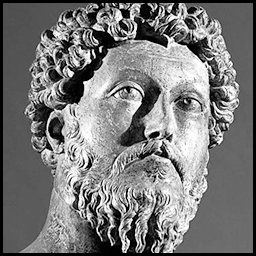a.k.a: Imperator Caesar Marcus Aurelius Antoninus Augustus
Occupation: Emperor
Born: 121
Died: 180
Brief Description:
Marcus Aurelius was born in Rome in 121 AD. He was the son of a Roman aristocrat and was well-educated in philosophy and literature. He became interested in Stoicism, a school of thought that emphasized the importance of living in accordance with reason and virtue.
As a young man, Marcus became close friends with the future emperor Antoninus Pius, and he later married Antoninus’ daughter, Faustina. When Antoninus became emperor in 138 AD, he appointed Marcus as his co-ruler, and upon Antoninus’ death in 161 AD, Marcus became the sole ruler of the Roman Empire.
Marcus Aurelius is best known for his role in leading the Roman Empire during a time of political and military turmoil. During his reign, the empire was threatened by invasions from barbarian tribes and was also plagued by natural disasters, including a series of devastating plagues. Despite these challenges, he remained committed to his philosophical beliefs and sought to apply them to the governance of the empire. He was known for his fair and just rule, and he worked to improve the lives of his subjects by building public works, such as aqueducts and roads, and by establishing charitable institutions.
In addition to his political accomplishments, Marcus Aurelius is also known for his writings, which include the famous “Meditations,” a series of philosophical reflections on the Stoic way of life. In these writings, Aurelius reflects on his own experiences and struggles and offers wisdom and guidance on how to live a virtuous life.
Marcus Aurelius is remembered as a wise and just ruler who was deeply committed to living a virtuous life. His philosophy has had a lasting influence on Western thought and continues to be studied and admired to this day. He is often considered one of the greatest philosophers in history and is revered as a symbol of courage, wisdom, and integrity.
Why he’s on the list:
I could talk about Marcus Aurelius’ virtues or his character or some of his achievements or go in depth into some of his thoughts from Meditations. And I do like the Stoic philosophy in general. But none of those are the real reason he’s on my list.
When Marcus Aurelius wrote his Meditations, it didn’t have a title (at least not that we know of). It probably wasn’t even meant to be published and was later simply referred to as Marcus’ writings to himself.
Marcus likely didn’t care about posthumous fame either. As he says: “People out for posthumous fame forget that the generations to come will be the same annoying people they know now. And just as mortal. What does it matter to you if they say x about you, or think y?
This is similar to my list of portraits. Even though I am writing my portraits publicly, I’m writing them for myself as a form of introspection. If they’re public, it’s only because my readers give me the motivation to actually write them down instead of keeping them as mere thoughts and for that, thank you. =)
